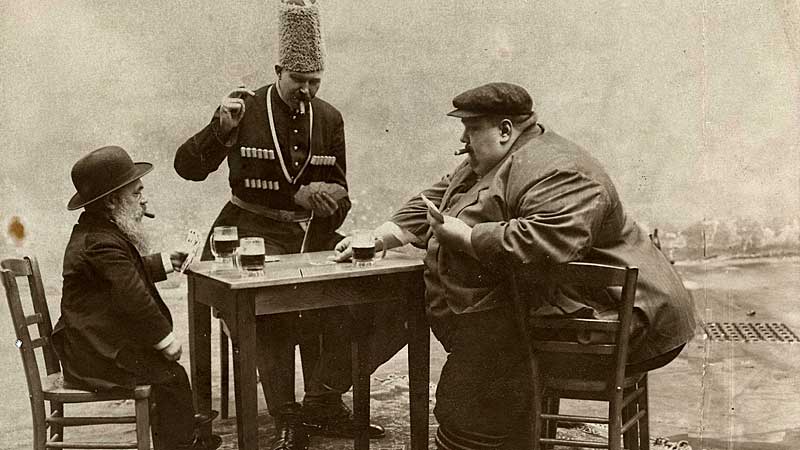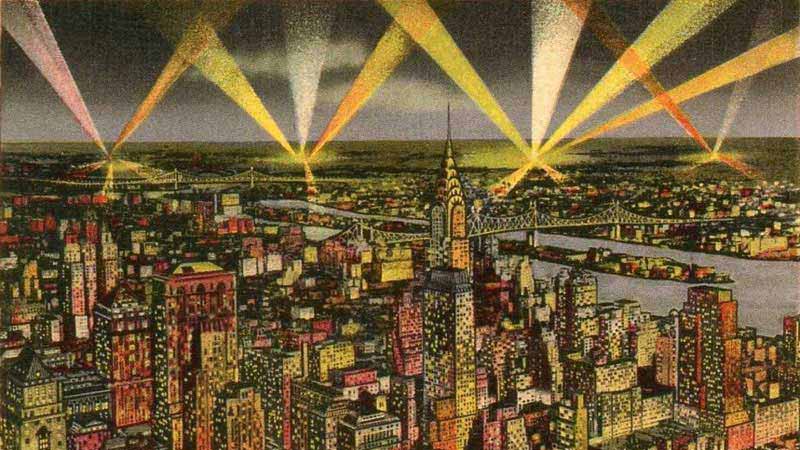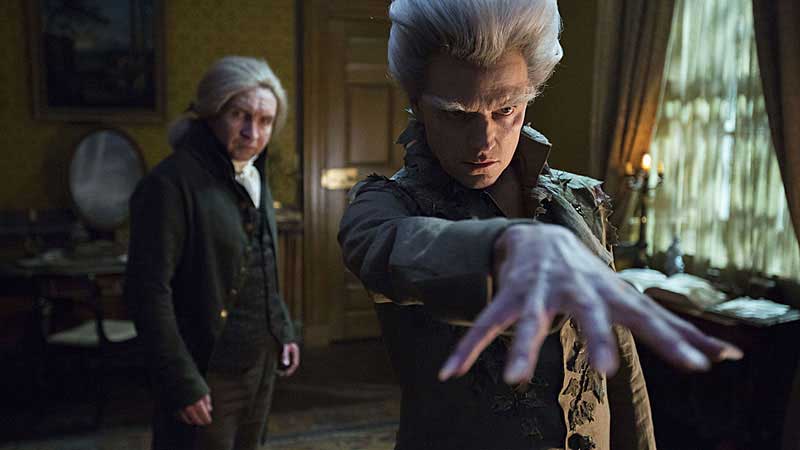Harrison Carrol "Secrets from a Trade Show Master" Podcast Interview
by Christian Painter and Roland Sarlot
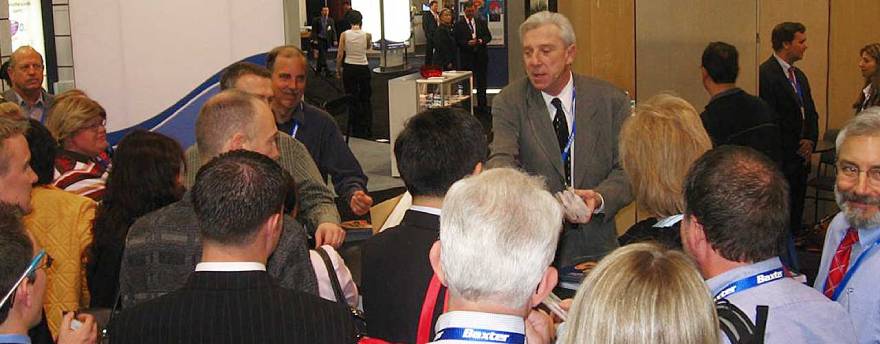
What We'll Explore
Harrison Carrol, the inventor of the term "trade show magician", shares trade show pay negotiation strategies, the responsibilities of the performer, where to start in the business, and what you're really selling to your client.
Who is Harrison Carrol?
Harrison Carrol is a retired trade show magician who worked in the trade show industry for 30 years. He has performed in 13 different countries and for over 20 Fortune 500 companies. He has been on the cover of M.U.M magazine and worked with some of the greats of the trade show industry.
Running Time:
The following interview has been edited and condensed for clarity.
What you can do
You are welcome to share up to 500 words of the below transcript in a non-commercial purpose provided you credit and link back to our site like this: "The Magic Oracle Business Podcast".
The Interview
Christian Painter: On this episode of the Magic Business Podcast...
Harrison Carrol: They should be asking me questions about how do I learn and understand the underbelly of the trade show industry. What I'm talking about is cost per foot of concrete, traffic density, and all of these metrics that companies use to evaluate whether or not they even want to be in a trade show. There is a subculture to the industry beyond the company itself.
Christian Painter: Welcome to the Magic Business Podcast, where we share insightful and delightful inner secrets about the business of magic. This is where magic professionals present their real-life experiences and some of their most guarded secrets to help further your career in the magical arts. I'm your host, Christian Painter in partnership with the MagicOracle.Club, where you can hear all of our magic business podcasts.
The trade show market has a lot of misconceptions. This podcast is going to clear those up for you so you know exactly what trade show magic is all about.
Harrison Carrol lives in Buffalo, New York, and is a retired trade show magician. He worked in the trade show industry for 30 years. He has performed in 13 different countries and for over 20 Fortune 500 companies. He has been on the cover of M.U.M magazine. He has worked with Eddie Tullock, Dick Ryan, Dick Stoner, Paul Gertner, Bill Goldman, Tim Conover, Scott Tokar, and Danny Orleans. If you don't know who these people are, I will tell you they are the giants of the trade show industry. And here's an interesting fact, he actually coined the term trade show magician. Please welcome to the show, Harrison Carrol.
Harrison Carrol: Hey Christian. Great to talk to you.
Christian Painter: I'm so looking forward to this podcast. I think the first thing we have to explain is, what is a trade show?
Harrison Carrol: A trade show is historically of course, years ago it was different, but a flea market could be considered a trade show. It's where people go to the market with their products and other people go there to look at them, learn about them, and potentially to buy them. Today they're are a lot more high tech, there are a lot of studies, they've honed their craft in how they're going to present themselves. And it's far more sophisticated than it was years and years and years ago.
Christian Painter: So that the listeners have an idea of your experience, when was your very first trade show?
Harrison Carrol: 1982.
Christian Painter: And you just retired not too long ago.
Harrison Carrol: Correct.
Christian Painter: Because you were considered one of the best in the business, where-
Harrison Carrol: Arguably.
Christian Painter: You're always humble. You're always humble, Harrison. But also explain that there are different levels of trade shows, right? Different tiers?
Harrison Carrol: Absolutely. And a lot of new people don't really understand that, but there are small hotels shows. There are local shows, regional shows, there are national shows and of course, there are international shows. There are even user groups, meetings which have exhibits. For example, IBM might have a trade show which is combined with a series of meetings and vendors who work with IBM may exhibit at that show. So it may not be a National Association of Broadcasters, big show. It may not be that. So those are the granddaddies, the top 200 are big.
Christian Painter: What you're hoping to get to.
Harrison Carrol: Yeah. That's where you're going to make your best money. You're going to have your best exposure for future business. And as an entertainer, it's going to be more fulfilling in many cases.
Christian Painter: So when I'm hired and I come to the booth at the trade show, what's my job? What am I supposed to do?
Harrison Carrol: Well, first of all, it depends on the company. Some companies want to increase lead count. Some companies just want to increase impressions. So we need an understanding of what the company's goals are but ultimately we need first and foremost to bring people to that booth. So our goal, regardless of the show, whether it's an international show or a local show, is in many cases the same. We have to get people to stop.
Christian Painter: I do know a lot of magicians believe, well, I'm a close-up magician. I'm a really good close-up magician. So this'll be great for me because I can just sit and do a close-up show.
Harrison Carrol: Sometimes but not always. And your close-up show, again, has to integrate with the corporate identity culture and their messaging. So it's just not enough to go there and just do magic. They don't need a specialist to just do magic. And often in the bigger booths, your close-up can't be seen by 80 people when you're on a tabletop so you need to bring it up, in the air, and it almost becomes a stand-up show as opposed to a close-up show.
Christian Painter: So if I'm going to work at trade shows, I better have an array of tools. I can't just rely on some close-up because different trade shows will have different environments.
Harrison Carrol: And you've been in the same trade show. You could start out with two people and you're doing close-up, pretty soon you've got four, six, eight, you're still on the table doing close-up. Now you got 15 people and it's starting to get hard for them to see the tabletop. So your close-up show may have to evolve into a stand-up show by the end of your specific set. So if you continue just doing close-up on the tabletop, you're not going to get the big crowd.
Christian Painter: So you better be able to roll with the punches is what you're telling me.
Harrison Carrol: To a degree because two things will happen. If people cannot see, they'll leave. If people cannot hear you, they'll leave. So A, you need a decent sound system and B, they got to be able to see what you're doing.
Christian Painter: Already I'm seeing more challenges than maybe the average magician would believe that they're just going to come and do a trade show with their deck of cards.
Harrison Carrol: Yeah. Eddie Tullock did a trade show with a deck of cards for years, but again, he's off the table. He's holding them up at eye level when he's doing things, not doing table riffles and things like that. And you learn to adapt or you don't. If you don't, you're out of the business. But you learn to adapt and say, "This isn't working. I need to get this thing up in the air. People have to be able to see what I'm holding when I reference it." So I think most magicians do figure that out if they're serious about the business.
Christian Painter: So when you begin, someone says, "Okay, I want to try this. I'm going to dip my foot in." And we're not obviously going to start at the international level. What level, where are we shooting for? How do we get into it?
Harrison Carrol: I would say, first of all, you shoot for whatever you can get. If it's a local show, you do it. The local home and garden show, I don't know, but you grab whatever you can get. Maybe it will be a national show. A lot of guys I saw there time first shows were at a national show. Why? Because they met someone, a client or a potential client that became a client that happened to do, we'll say the National Home Builders Show, so whammo, all of a sudden they're in a national show. But then the question becomes, how big is this client? How much space do they take? Because if they're in a 10 by 10, in a linear aisle, you're not going to get a lot of people. And that hurts your potential for success.
Christian Painter: Before we even go there, let's cover a couple of things I know listeners always want to know. And that is, what is my pay range in the trade show industry?
Harrison Carrol: That is a million dollar question because when I left, the rates were all over the place. Eddie Tullock, let me just, if I can regress, Eddie Tullock was getting $1,000 a day in the '60s.
Christian Painter: Which was a ton of money in the '60s.
Harrison Carrol: It was and plus his expenses. Then when Eddie left the business, he was still getting 1,000 a day, but that was Eddie. Other people surpassed him. When I left, there were guys getting three grand a day. Joel Bauer was probably getting 20 grand a show, 25 grand a show.
Christian Painter: Now, when you say a show, how many days is that?
Harrison Carrol: Let's say three. Shows used to go four, some shows still go four, but generally you blow off the last day.
Christian Painter: Now, wait, are we charging them per day or are we charging them per show?
Harrison Carrol: Okay. I'll get back to the rates in a minute. I learned that the hard way. The minute you charge per day, if it's a three-day show, the client says, "Well, the last day's dead." Which it is in 90% of the shows. “So we don't need you for the last day.” So you just lost a third of your pay.
Christian Painter: That's not good.
Harrison Carrol: No. So I learned that very early on and I said, this is crazy. So I started charging a show rate. I don't care if it's three days, it's two days, four days, here's your rate. And I had clients say to me when I started charging the show rate, "Well, the last day's dead, what if we only use you for two? Would it be cheaper?" And I would argue, "Hey, you're not pulling off the carpet on the second day. You're not taking down graphics on the second day. It's a team commitment to a total show. We're all here to give 100% to maximum productivity. So if we're going to start cutting corners here and there, what do you got? What happens if you took the carpet out of the booth?" Of course, they can't, they got furniture on it "but how would you look on that last day even though it's slow?"
Christian Painter: So you're just selling them on the idea that you're important for every single day of that show.
Harrison Carrol: Yeah. Plus I don't want to give up any money. So if I'm not going to give up money, what's my reason that would placate their analysis of it?
Christian Painter: Very smart. Very smart. So now we get an idea of how you would charge, right? You're charging-
Harrison Carrol: Yeah. But I started to mention, Lisa Menna was getting 20 some grand a show. That was insane. Nobody was getting that kind of money. So I think when I left, just before I left, I boosted my rates to like 9,000 for a show, but I still had clients at 7,500 because I never wanted to raise existing clients ever, unless I absolutely was with them like 10 years. But even though I was getting that, there were guys still going out for like two grand, three grand. So they started hurting the market because if they were good, it's even worse.
Christian Painter: Understood. Yes.
Harrison Carrol: Because now the client's were like, "Well, we love our guy and he's great but why are you so much?" So that became a problem. It started in the '90s when the trade show industry exploded because of the computer explosion. There was work for anybody and everybody, and people started showing up out of the woodwork and some of them were going out very cheap and it hurts the market. It brings our value down.
Christian Painter: So currently, and of course also your rate is going to depend on what tier the trade show's in. Is that correct?
Harrison Carrol: How important that show is to that exhibitor. I'll give you an example. One of my clients was Xerox. Xerox did a big show. They did the print show and there was a show called Explore, which is a very big show for them. But then the Food Marketing Institute had a show, which was actually, I would think bigger than Explore, but Xerox's commitment to Explore was huge. They went to FMI, the Food Marketing Institute, but they didn't want to spend a lot of money. So they had like a 10 by 20 booth and they wanted me to go because, hey, we could have the magician. We only have to have a small staff. So from my point of view, I got my same rate because that's what they were used to paying.
But from my point of view, if I were pricing this new and I knew both shows, I would think if I... And it wasn't Xerox, it was an unknown name, I would think, well, I'm not going to get as much in a 10 by 20 as I'm going to get in this big 90 by 120 booth, 90 feet by 120 feet, because their commitment is so great, which means their budget is great. Which means they're going to spend heavily and I want to be part of that. In the 10 by 20, not so much. Same company, different approach to that specific show.
Christian Painter: He's talking about the size of the booths and some people.
Harrison Carrol: Precisely. And certain companies, a lot of big companies, their booths are custom built. You could go to a show and see companies with rented booths or pop-ups that they pull out of a can and it pops open. Obviously they're not invested in that show the same as the person that has the customized booth. Why is that important? Because it's easier for us to sell based on their commitment and get our fee. So when you're out there trying to get a fee, you have to take these things into consideration, especially when you're new and understand that dynamic so that you can charge accordingly and appropriately.
Christian Painter: So, Harrison, what you're saying is we got to do a little research before we approach a client and try to sell ourselves at that trade show?
Harrison Carrol: Absolutely. And not just research in that regard but research in terms of who the client is. What do they sell? Understand their product so that when you go in to talk to them...
Christian Painter: And I think there's a mistake magicians make is, they think they're selling magic, is what they think they're selling, but they're not.
Harrison Carrol: They do. No, they're selling solutions.
Christian Painter: That is so good. I like that.
Now, I also want to say in the introduction, we said something pretty bold. How did you invent the word trade show magician?
Harrison Carrol: Bill Goldman might remember this, because we were in Chicago, Whit Haydn was there, Pop Haydn I should say was there too. And we were discussing how people, when you try to sell them, saw a magician as someone who did parties. It was fun for the kids, but it's not something I'm going to put in my exhibit. And I had several sales scenarios that reminded me of that. Actually, I don't know if I ever told you the story about ITT. If not, I'll tell it to you. But it was all these things that had built up and I said, "How do we differentiate ourselves from just being a magician?" So then I started selling that we were specialists. We don't do those parties. We don't do bar mitzvahs. All we do are trade shows.
So I started telling people that I'm a specialist. This is all I do. And magic is not an end in itself. It's a tool to meet your trade show objectives. And then I started using the word on my website "trade show magician" and it just evolved from there. And then other people started using it. And then now it's become pretty common.
Christian Painter: And then immediately, of course, when they hear that, then they assume, oh, this is what he does. So he might be good at it.
Harrison Carrol: Well, I would hope. I don't know. I think there are still, even though a lot of companies are very astute in analyzing the productivity of their trade show, at attacking a philosophy to implement at the show, I got to a point where many times I knew more about the business of trade shows than they did. And then you have to be careful because especially with young people, they get put in this job and they think it's important and they're big shots. You got to be careful with their egos.
Christian Painter: So Harrison, because in this we're on the website, the MagicOracle.Club. And in this moment, you are the magic oracle. And I'd like to ask this question, and that is, when you talk with people who are interested in trade shows, what is the one question they never ask you but you wish they did?
Harrison Carrol: Well, I'll tell you the one question that they do ask me that I don't like is, "How much do you make? How did you get this gig?" Terms like that. When they should be asking me questions about how do I learn and understand the underbelly of the trade show industry? And a lot of trade show magicians who are successful don't even pay attention to a lot of that stuff. If they've been around a long time, they assimilate some knowledge, but nobody seeks it. And nobody, I don't remember one person ever coming up to me and asking me, "How do I learn about the trade show industry?" And what I'm talking about is, cost per foot of concrete, traffic density and all of these metrics that companies use to evaluate whether or not they even want to be in a trade show. And what kind of productivity was yielded from the trade show? But nobody ever asked me stuff about the industry and there isn't a subculture to the industry beyond the company itself.
Christian Painter: So again, we're going to go back to where I said, most magicians are going to come at this thinking they're selling a magic show when they're not. And you said it earlier, you said you're selling a solution. So tell me, once you've researched, let's say you wanted to sell yourself to this one company and you've researched them. When you sit down, what are you telling those people in the meeting? How are you selling yourself?
Harrison Carrol: I'm selling against what they're doing, first of all, because I can't sell myself until I know what it is they're already doing. So let's say they're doing nothing.
Christian Painter: What does that mean?
Harrison Carrol: Well, it's a little easier to sell, but let's say they're already doing something. I have to somehow present an alternative that's more productive, more fun, more engaging than the solution they're using now. For example, somebody puts a race car in the booth.
Christian Painter: Okay.
Harrison Carrol: Okay? Are people are going to come? They're going to look at the race car. My attitude is, can the race car talk to people? People walk by, they look at it, 30 minutes later, "Did you see that race car down at the..." "It's down that way." "What booth?" "I don't know." They don't even know what booth they saw it in. Now some people might, but when you have a front man, a spokesperson, a mouthpiece bragging about your company in a friendly, engaging manner, which is going to be more beneficial to you and probably cheaper? Because you don't have drayage for the race car, shipping for the race car, all of the costs of getting the race car into your booth.
Christian Painter: Wow.
Harrison Carrol: So I'm selling against the race car within the company.
Christian Painter: This is really good stuff Harrison. We are running out of time, but I want to ask you, would you come back again because there's still more questions I have for you?
Harrison Carrol: You know what, I would love to. It's like we didn't even scratch the surface of any...
Christian Painter: I feel the same way, but we've already been on for quite a while. And yeah, there's so much good information going on and I know you and I know how much more good information you are. So we're going to have you back. No problem. Thanks so much for being on the show today, Harrison.
Thank you for listening to our Magic Business Podcast. Please visit the MagicOracle.Club where you can hear all of our magic business podcasts and enjoy a vast array of additional magical knowledge. Here is an excellent quote from Lucille Ball. "One of the things I learned the hard way was it doesn't pay to get discouraged." As always, we at the Magic Oracle wish you continued success on your path in the magical arts.
A Jolly Genie?
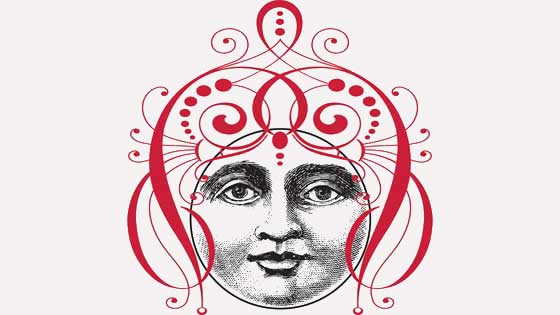
The Magic Oracle is a FREE site but I still must pay dastardly server fees! Please, donate ANY amount... $1, $5, $10, why not $1 million?
THANK YOU for keeping magic alive... and me, a Jolly Genie!

